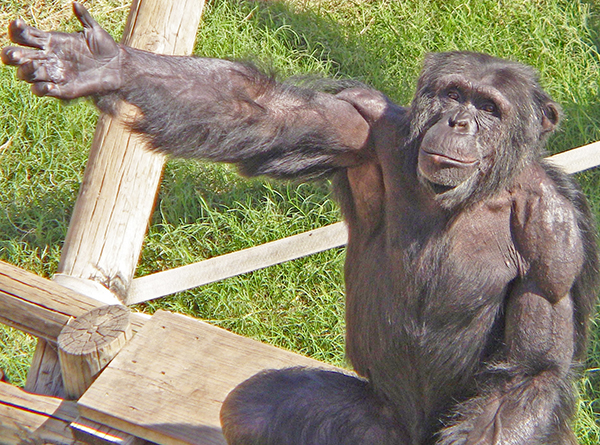Scientists claim that monkey intelligence has been incorrectly evaluated for decades.

The 28-year-old chimpanzee points to bananas in the distance, looking at a man with a camera. Photo: Lisa A. Reamer
A hundred years ago, developers of intelligence tests were sure that they created adequate rules for measuring the innate intellectual abilities of people. By the mid-20th century, it became clear that the results of these tests are strongly influenced by non-hereditary factors, that is, the environment, the current state of a person, and so on. Therefore, the attitude towards IQ tests was revised, so that they are now regarded as an effective way of predicting possible intelligence, and not as a tool that reveals some important information about mental abilities. We now know for sure that intellectual indicators in humans are derived from the interaction of genes and the environment. Thus, a depleted environment has a systematic adverse effect on mental development.
Despite all the achievements of the science of measuring intelligence, even the most prestigious journals continue to print incorrect comparisons of the human and ape IQs, which state that the social intelligence of human babies, even from 12 months of age (!), Is inherently superior to the social intelligence of our closest hominid relatives, great apes. A group of scientists from the University of Sussex, the University of Portsmouth (both UK) and the University of Georgia (USA) published an analysis of similar IQ benchmarking tests, which proved why previous scientific research in this area put people and other hominids in unequal conditions, that is, it incorrectly their intellect, giving preference to man.
“Decades of research and our understanding of the abilities of monkeys are based on a fundamental error that is associated with such strong conviction in our own superiority that scientists have come to believe that human children are more socially capable than adult monkeys,” says Dr. David Leavens (David Leavens), one of the authors of the scientific work. - As humans, we see ourselves at the top of an evolutionary tree. This has led to a systematic elevation of the mental abilities of human babies, on the one hand, and biased research that discriminates against monkeys, on the other. ”
Scientists lead a lot of discrimination in testing monkeys. For example, in tests for non-verbal gestures of human cubs that grew up in the Western environment, immersed in cultural conventions on the meaning of gestures, were compared to monkeys that grew in a cage without cultural interaction. When testing gestures in accordance with the Western Cultural Convention, of course, human cubs showed the best result.
In another study, 12-month-old human children were compared with 18-19-year-old monkeys in a test for the ability to point the hand at a missing object. The researchers did not take into account the age, experience and biography of monkeys. Those did not cope with the test, from which a false conclusion was made about the superiority of man. In subsequent years, it was proved that monkeys can also point to the past the location of the missing object and discuss this topic.

Monkeys demonstrate complex behavior, but their intelligence is incorrectly compared to human. Photo: Enrico Ferorelli
Scientists have analyzed hundreds of scientific studies in previous decades. Almost all of them incorrectly evaluated the intelligence of monkeys. “Even if the monkeys were clearly superior to the intelligence tests of human children, the researchers were inclined to interpret the superior intelligence of the monkeys as a manifestation of lower cognitive abilities. There is not a single scientifically significant report on the significant differences between monkeys and humans in their ability to use and understand the meaning of gestures. None, the scientist emphasizes. “This does not mean that such a difference will not be found in the future, but much of the existing research has been conducted incorrectly.”
The authors of the scientific work cite the classic work of Stephen Jay Gould “The False Dimension of Man ” (1981) as one of the main theses. Accordingly, their scientific article bears the similar title “The False Dimension of the Social Cognitive Abilities of the Apes” (The mismeasure of ape social cognition).
Such a prejudice of scientists to monkeys is not something new. For example, a hundred years ago, scientists were convinced of the intellectual superiority of the North Europeans over the representatives of Southern Europe and the Slavic peoples. This was taken as an axiom, as now the superiority in the social intelligence of human cubs over monkeys or in the intellectual superiority of the white race over the black. In fact, the difference is made by the environment: for example, the black representatives of the northern states of the USA demonstrate better results in the IQ tests than the black representatives of the southern states.
Scientists offer several options for how to correctly measure the social intelligence of monkeys. First, you need to make a correct sample. And then scientists are used to comparing educated people from Western countries with random monkeys. Secondly, before measuring their abilities, they recommend training monkeys to perform a specific test, and ideally measuring the abilities of a monkey that was “adopted” by people and lived alongside them for a long time. However, the latter option raises a number of ethical issues.
The scientific article was published on August 4, 2017 in the journal Animal Cognition (doi: 10.1007 / s10071-017-1119-1).
All Articles